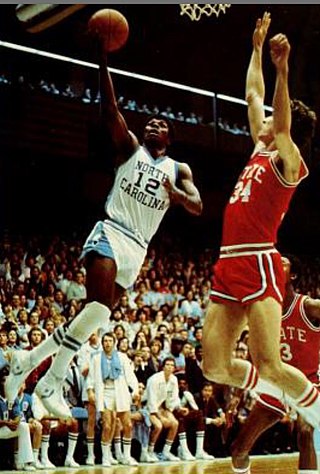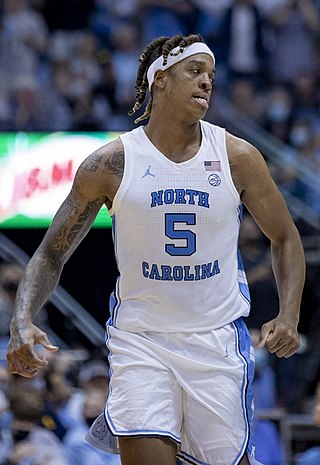The Atlantic Coast Conference Men's Basketball Player of the Year is an award given to the men's basketball player in the Atlantic Coast Conference (ACC) voted as the most outstanding player. It has been presented since the league's first season, 1953–54, by the Atlantic Coast Sports Media Association, and beginning in 2012–13 has also been presented in separate voting by the league's head coaches. The award was first given to Dickie Hemric of Wake Forest, and the coaches' award was first presented in 2013 to Shane Larkin of Miami.

Andrew Tyler Hansbrough is an American former professional basketball player. He has played in the National Basketball Association (NBA) for seven seasons, as well as internationally.

Roy Allen Williams is an American retired college basketball coach who served as the men's head coach for the North Carolina Tar Heels for 18 seasons and the Kansas Jayhawks for 15 seasons. He was inducted into the College Basketball Hall of Fame in 2006 and the Basketball Hall of Fame in 2007.
Matthew Francis Doherty is an American former college basketball coach best known for his time as head coach of the University of North Carolina Tar Heels men's basketball team. Prior to accepting the head coaching position at UNC he spent one season as head coach of the University of Notre Dame Fighting Irish men's basketball program.

Phil Jackson Ford Jr. is an American former professional basketball player in the National Basketball Association (NBA). He graduated from Rocky Mount Senior High School in 1974, and had an All-American college career with the North Carolina Tar Heels.

Woody Lombardi Durham was an American play-by-play radio announcer for the North Carolina Tar Heels football and men's basketball programs from 1971 to 2011.

Leonard Robert Rosenbluth was an American professional basketball player in the National Basketball Association (NBA), but he is remembered, first and foremost, for his college basketball player days. He played college basketball for the North Carolina Tar Heels, where he was Helms Foundation Player of the Year (1957), consensus first-team All-American (1957), second-team All-American – AP, UPI, INS (1956), third-team All-American – NEA, Collier's (1956), ACC Player of the Year (1957), and 3× first-team All-ACC (1955–1957).

The North Carolina Tar Heels are the intercollegiate athletic teams that represent the University of North Carolina at Chapel Hill. The name Tar Heel is a nickname used to refer to individuals from the state of North Carolina, the Tar Heel State. The campus at Chapel Hill is referred to as the University of North Carolina for the purposes of the National Collegiate Athletic Association. Since the school fostered the oldest collegiate team in the Carolinas, the school took on the nickname Carolina, especially in athletics. The Tar Heels are also referred to as UNC or The Heels.

The North Carolina Tar Heels Men's basketball program is a college basketball team of the University of North Carolina at Chapel Hill, having one of the greatest traditions in the history of college basketball. The Tar Heels have won six national championships, in addition to a Helms Athletic Foundation retroactive title (1924), and participated in a record twenty-one Final Fours. It is the only school to have an active streak of reaching the National Championship game for nine straight decades and at least two Final Fours for six straight decades, all while averaging more wins per season played (20.7) than any other program in college basketball. In 2012, ESPN ranked North Carolina No. 1 on its list of the 50 most successful programs of the past fifty years.

The North Carolina Tar Heels women's basketball team represent the University of North Carolina at Chapel Hill in the Atlantic Coast Conference of NCAA Division I women's college basketball. They are led by head coach Courtney Banghart, who is in her fourth season.
The 2007–08 Atlantic Coast Conference men's basketball season was the 55th season for the league. The North Carolina Tar Heels won both the regular-season and conference titles. The ACC sent four teams to the NCAA tournament: North Carolina, Duke, Clemson and Miami.

The 2008–09 North Carolina Tar Heels men's basketball team represented the University of North Carolina at Chapel Hill. The head coach was Roy Williams. The team played its home games in the Dean Smith Center in Chapel Hill, North Carolina, and was a member of the Atlantic Coast Conference. The team won the 2009 NCAA Division I men's basketball tournament, the fifth NCAA national title in school history. Considered one of the greatest teams in college basketball history, the Tar Heels won their six NCAA tournament games by double digits, and by an average of 19.8 points per game. They were ranked as the 30th best team in college basketball history by Bleacher Report in 2012.

Tyler Paul Zeller is an American former professional basketball player. He played college basketball at the University of North Carolina, where as a freshman he played on their 2009 national championship team and as a senior was an All-American and the Atlantic Coast Conference Player of the Year. He is the nephew of former NBA player Al Eberhard, and the brother of fellow NBA players Cody Zeller and Luke Zeller.

Richard Cartwright "Cart" Carmichael was a college basketball player. He was the first member of the North Carolina Tar Heels to earn All-America honors in any sport, when he was named to the 1923 first team for men's basketball, an honor he also received in 1924. Carmichael could play all three positions: guard, forward, and center. He is the earliest UNC player with his jersey "honored" in the rafters.
The 2008–09 Atlantic Coast Conference men's basketball season was the 56th season for the league. North Carolina won the regular season crown while Duke won the ACC Tournament championship. The season saw Tyler Hansbrough set conference records in points and free throws made (982), while Miami's Jack McClinton ended his career as the conference's all time three-point marksman.

Robert John Frasor is a retired American professional basketball player, former college coach and currently a head high school coach. He was born in Blue Island, Illinois to Bob and Donna Frasor. His father won 298 games in 27 years as head basketball coach at Eisenhower High School. Bobby Frasor played at North Carolina from 2005 to 2009 as both point guard and shooting guard.
The 2000–01 North Carolina Tar Heels men's basketball team represented the University of North Carolina at Chapel Hill during the 2000–01 NCAA Division I men's basketball season. Their head coach was Matt Doherty. The team captain for this season was Brendan Haywood. The team played its home games in the Dean Smith Center in Chapel Hill, North Carolina as a member of the Atlantic Coast Conference.

Armando Linwood Bacot Jr. is an American college basketball player for the North Carolina Tar Heels of the Atlantic Coast Conference (ACC). He holds the program records for double-doubles and career rebounds.











